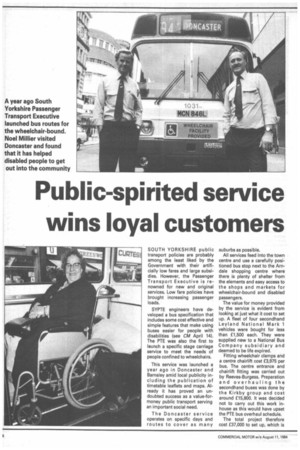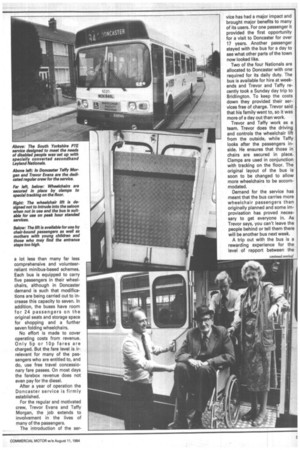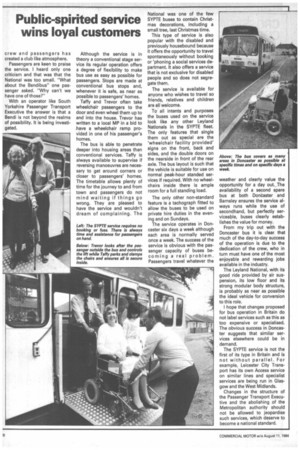Public-spirited service wins loyal customers
Page 28

Page 29

Page 30

If you've noticed an error in this article please click here to report it so we can fix it.
SOUTH YORKSHIRE public transport policies are probably among the least liked by the Government with their artificially low fares and large subsidies. However, the Passenger Transport Executive is renowned for new and original services. Low fare policies have brought increasing passenger loads.
SYPTE engineers have developed a bus specification that includes some cost effective and simple features that make using buses easier for people with disabilities (see CM April 14). The PTE was also the first to launch a specific stage carriage service to meet the needs of people confined to wheelchairs.
This service was launched a year ago in Doncaster and Barnsley amid local publicity including the publication of timetable leaflets and maps. Already it has proved an undoubted success as a value-formoney public transport serving an important social need.
The Doncaster service operates on specific days and routes to cover as many suburbs as possible.
All services feed into the town centre and use a carefully positioned bus stop next to the Amdale shopping centre where there is plenty of shelter from the elements and easy access to the shops and markets for wheelchair-bound and disabled passengers.
The value for money provided by the service is evident from looking at just what it cost to set up. A fleet of four secondhand Leyland National Mark 1 vehicles were bought for less than £1,500 each. They were supplied new to a National Bus Company subsidiary and deemed to be life expired.
Fitting wheelchair clamps and a centre chairlift cost £3,975 per bus. The centre entrance and chairlift fitting was carried out by Reeves-Burgess. Preparation and overhauling the secondhand buses was done by the Kirkby group and cost around £15,800. It was decided not to carry out this work inhouse as this would have upset the PTE bus overhaul schedule.
The total project therefore cost £37,000 to set up, which is a lot less than many far less comprehensive and volunteerreliant minibus-based schemes. Each bus is equipped to carry five passengers in their wheelchairs, although in Doncaster demand is such that modifications are being carried out to increase this capacity to seven. In addition, the buses have room for 24 passengers on the original seats and storage space for shopping and a further seven folding wheelchairs.
No effort is made to cover operating costs from revenue. Only 5p or 10p fares are charged. But the fare level is irrelevant for many of the passengers who are entitled to, and do, use free travel concessionary fare passes. On most days the farebox revenue does not even pay for the diesel.
After a year of operation the Doncaster service is firmly established.
For the regular and motivated crew, Trevor Evans and Taffy Morgan, the job extends to involvement in the lives of many of the passengers.
The introduction of the ser vice has had a major impact and brought major benefits to many of its users. For one passenger it provided the first opportunity for a visit to Doncaster for over 17 years. Another passenger stayed with the bus for a day to see what other parts of the town now looked like.
Two of the four Nationals are allocated to Doncaster with one required for its daily duty. The bus is available for hire at weekends and Trevor and Taffy recently took a Sunday day trip to Bridlington. To keep the costs down they provided their services free of charge. Trevor said that his family went to, so it was more of a day out than work.
Trevor and Taffy work as a team. Trevor does the driving and controls the wheelchair lift from the outside, while Taffy looks after the passengers inside. He ensures that those in chairs are secured in place. Clamps are used in conjunction with tracking on the floor. The original layout of the bus is soon to be changed to allow more wheelchairs to be accommodated.
Demand for the service has meant that the bus carries more wheelchair passengers than originally planned and some improvisation has proved necessary to get everyone in. As Trevor says, you can't leave the people behind or tell them there will be another bus next week.
A trip out with the bus is a rewarding experience for the level of rapport between the crew and passengers has created a club like atmosphere.
Passengers are keen to praise the service. I heard only one criticism and that was that the National was too small. "What about the Bendibus" one passenger asked. "Why can't we have one of those?"
With an operator like South Yorkshire Passenger Transport Executive the answer is that a Bendi is not beyond the realms of possibility. It is being investigated. Although the service is in theory a conventional stage service its regular operation offers a degree of flexibility to make bus use as easy as possible for passengers. Stops are made at conventional bus stops and, whenever it is safe, as near as possible to passengers' homes.
Taffy and Trevor often take wheelchair passengers to the door and even wheel them up to and into the house. Trevor has written to a local MP in a bid to have a wheelchair ramp provided in one of his passenger's homes.
The bus is able to penetrate deeper into housing areas than conventional services. Taffy is always available to supervise if reversing manoeuvres are necessary to get around corners or closer to passengers' homes. The timetable allows plenty of time for the journey to and from town and passengers do not mind waiting if things go wrong. They are pleased to have the service and wouldn't dream of complaining. The National was one of the few SYPTE buses to contain Christmas decorations, including a small tree, last Christmas time.
This type of service is also popular with the disabled and previously housebound because it offers the opportunity to travel spontaneously without booking or 'phoning a social services department. It also offers a service that is not exclusive for disabled people and so does not segregate them.
The service is available for anyone who wishes to travel so friends, relatives and children are all welcome.
To all intents and purposes the buses used on the service look like any other Leyland Nationals in the SYPTE fleet. The only features that single them out as special are the 'wheelchair facility provided' signs on the front, back and sides, and the double doors on the nearside in front of the rear axle. The bus layout is such that the vehicle is suitable for use on normal peak-hour standed services if required. With no wheelchairs inside there is ample room for a full standing load.
The only other non-standard feature is a tachograph fitted to allow the buses to be used on private hire duties in the evening and on Sundays.
The service operates in Doncaster six days a week although each area is normally served once a week. The success of the service is obvious with the passenger capacity of buses beco ming a real problem. Passengers travel whatever the weather and clearly value the opportunity for a day out. The availability of a second spare bus at both Doncaster and Barnsley ensures the service always runs while the use of secondhand, but perfectly serviceable, buses clearly establishes the value for money.
From my trip out with the Doncaster bus it is clear that much of the day-to-day success of the operation is due to the dedication of the crew, who in turn must have one of the most enjoyable and rewarding jobs available in the industry.
The Leyland National, with its good ride provided by air suspension, its low floor and its strong modular body structure, is probably as near as possible the ideal vehicle for conversion to this role.
I hope that changes proposed for bus operation in Britain do not label services such as this as too expensive or specialised. The obvious success in Doncaster suggests that similar services elsewhere could be in demand.
The SYPTE service is not the first of its type in Britain and is not without parallel. For example, Leicester City Transport has its own Access service on similar lines and specialist services are being run in Glasgow and the West Midlands.
Changes in the structure of the Passenger Transport Executive and the abolishing of the Metropolitan authority should not be allowed to jeopardise such services, which deserve to become a national standard.




















































































